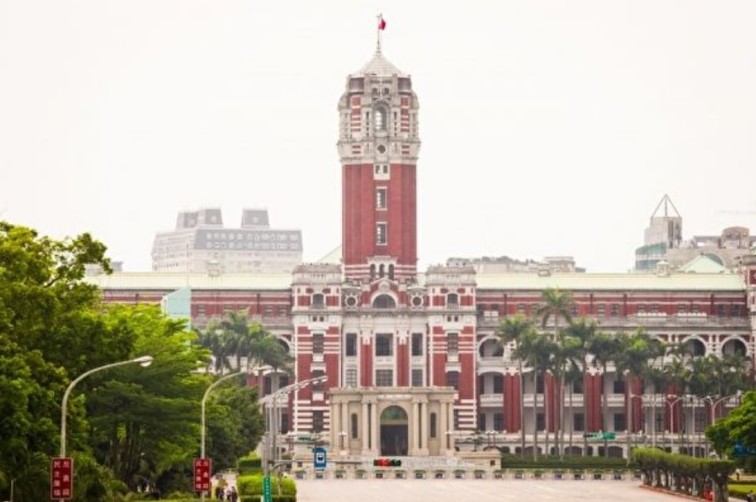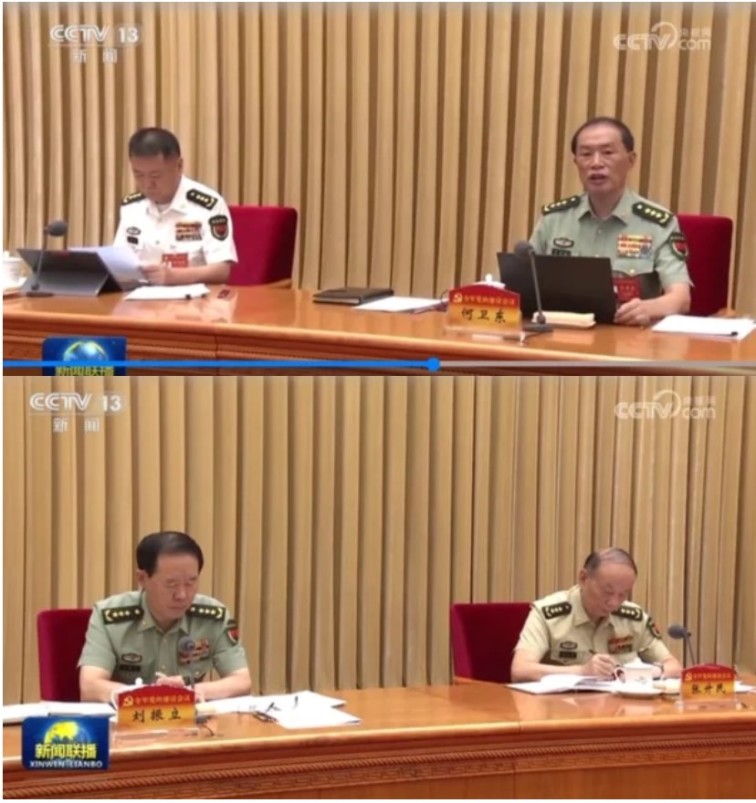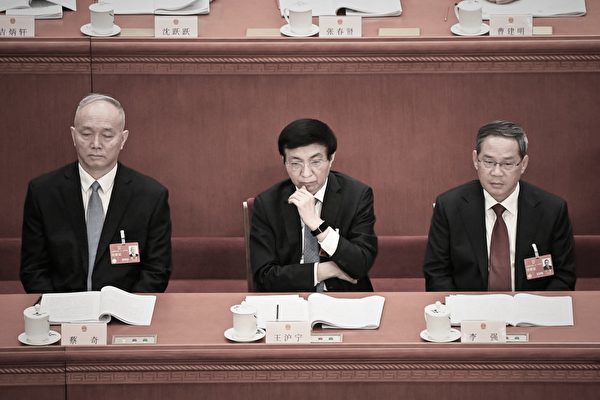Dark clouds hang over Tiananmen Square in Beijing. (Lintao Zhang/Getty Images)
[People News] Amid widespread overseas reports that Xi Jinping’s top military loyalist—Central Military Commission Vice Chairman He Weidong—has been arrested, Xi has lost control of the military, and power has slipped from his hands, the Chinese Communist Party’s state media has published a number of unusual reports about Xi in recent days. Here are five of them:
1. No Mention of Xi’s “Family-Style Gathering” with Belarusian President
On June 4, Xi Jinping met with visiting Belarusian President Alexander Lukashenko at Zhongnanhai. That day, Xinhua News Agency published a dispatch on the meeting.
The report contained only four paragraphs: one sentence each in the first and fourth, with the second and third paraphrasing “Xi said” and “Lukashenko said.” The entire article was bland and filled with diplomatic platitudes.
There was no mention that this was a “family-style gathering” between the two heads of state, nor whether Xi’s wife, Peng Liyuan or daughter, Xi Mingze, were present.
However, a June 8 report from the Belarusian Telegraph Agency (BelTA) in Minsk cited Belarus’s First Deputy Prime Minister Snopkov, who appeared on the “First Time” program of the state-run Belarusian TV channel ONT, relaying Xi’s own words:
“My friend, we have a special relationship, so this time our luncheon will be family-style. For the first time during a family-style luncheon with a foreign leader, my daughter will attend.”
Snopkov also noted that not only was Xi’s daughter present, but also his wife, Peng Liyuan.
According to Xi, because of the “special relationship” with Lukashenko, he hosted him in a “special” location—not Diaoyutai State Guesthouse, not the Great Hall of the People, but Xi’s residence in Zhongnanhai—and in a “special” format: a family-style luncheon, with his daughter present for the first time during such a foreign leader event. This was extraordinary.
Yet Xinhua's report didn’t reflect any of this “special” nature.
Belarusian media had also previously reported that Lukashenko’s visit was “not a state visit nor a working visit,” but rather “a small-circle family gathering.”
But Xinhua’s article made no mention of the meeting being a “family-style gathering” and entirely omitted the presence of Peng Liyuan and Xi Mingze.
2. No Mention of Xi’s Title
On the evening of June 5 (Beijing time), Xi Jinping had a phone call with U.S. President Donald Trump. At 8:50:19 p.m., Xinhua published a one-sentence news flash: “Xinhua Flash: Xi Jinping spoke with U.S. President Donald Trump on the phone.”
Just over three minutes later, at 8:53:45 p.m., another one-sentence update was released: “Xinhua, Beijing, June 5—On the evening of June 5, President Xi Jinping spoke with U.S. President Donald Trump by appointment.”
Xi is China’s head of state, and Trump is the U.S. head of state. In the current tense state of U.S.-China relations, a call between the two leaders is a major diplomatic event with global attention.
The CCP frequently emphasises that “there are no small matters in wording.” When Xinhua is specially authorised to report on news about Xi, every word is vetted.
Yet Xinhua’s first report omitted the time of the call, who initiated it, and most notably, Xi’s title as “President.” Was this an oversight by an editor?
I believe that’s unlikely. Xinhua operates under strict reporting protocols, with multiple layers of review. This omission was probably not accidental, but rather done under higher instruction, to deliberately signal that Xi is no longer in favour.
The second report on the same call included the missing elements: the time, the phrase “by appointment,” and Xi’s full title. However, the first report was not deleted, even by June 10, when I wrote this article. It seems the omission of Xi’s title was left deliberately visible, as if to highlight that the title “President of China” had been stripped.
3. No Mention of Xi Accepting U.S. Visit Invitation
At 10:46 p.m. Beijing time on June 5, Trump posted on Truth Social about his phone call with Xi, writing: “President Xi warmly invited me and the First Lady to visit China, and I extended an invitation in return. As heads of two great nations, we both look forward to such a visit.”
Trump also told the media in the White House’s Oval Office: “By the way, he [Xi] invited me to China, and I invited him here. We both accepted. So at some point I’ll visit China with the First Lady, and he’d like to come here with China’s First Lady.”
Yet at 10:48:32 p.m., Xinhua published a detailed report titled “Xi Jinping Speaks with U.S. President Trump by Phone.” The report stated: “Xi Jinping welcomed Trump to visit China again, and Trump expressed sincere thanks.” However, it made no mention of Trump inviting Xi and his wife to visit the U.S., nor that Xi accepted the invitation.
Why did Xinhua's official press release not mention a single word about Trump inviting Xi to visit the United States?
Considering widespread reports that Xi has lost military control and real power, if true, two outcomes are possible: 1. Even if Xi accepted Trump’s invitation during the call, it was merely empty talk. 2. Xi is no longer in a position to make a state visit to the U.S.
4. No Mention of Xi Inviting Lukashenko to Visit Again in August/September
A June 4 BelTA report from Beijing quoted Xi as telling Lukashenko and his delegation: “At the end of August, we will hold the Shanghai Cooperation Organisation summit in Tianjin. Shortly after, on September 3, we will solemnly commemorate the victory of the World Anti-Fascist War with a military parade. I sincerely invite you to attend, and I will be happy to see you again.”
However, Xinhua’s coverage did not mention Xi’s invitation for Lukashenko to visit China in August or September for either event.
Why did Xinhua's report avoid mentioning Xi's "sincere invitation" to Lukashenko?
Possibly because Xi has lost control of the military and broader political power, making his “sincere invitation” seem more like a formality, with no guarantee he’ll even be allowed to appear publicly.
Interestingly, the Belarusian report mentioned Xi’s “sincere invitation” but made no mention of Lukashenko warmly accepting or expressing anticipation to meet again soon—there was no enthusiastic response.
This suggests that China’s real powerbrokers, especially those controlling the military, remain uncertain about whether Xi will be permitted to appear.
5. Mystery Surrounding the Funeral of Xu Qiliang, Xi’s Former Top Military Ally
After the sudden death of Xu Qiliang—Xi’s former top military confidant and ex–Central Military Commission Vice Chairman—former Chinese journalist Zhao Lanjian posted a photo on June 5 on X (Twitter) showing Xu’s mourning hall set up at the Air Force Compound East District in Beijing.
Zhao reported that insiders confirmed this was Xu’s longtime military residence, part of a high-level military housing area. Funeral wreaths bore inscriptions such as “Air Force—Respectfully,” and “Honour Guard of the Air Force Command Bureau—Respectfully.”
But on June 8, Xinhua announced that Xu Qiliang’s funeral had been held at Babaoshan Revolutionary Cemetery, with all seven Politburo Standing Committee members, including Xi, attending the send-off.
Why was Xu’s mourning hall suddenly moved from the Air Force compound on June 5 to a high-profile funeral at Babaoshan on June 8?
Why did He Weidong, current Politburo member and Central Military Commission Vice Chairman, not send a wreath? He Weidong disappeared on March 11 and hasn’t been seen for over three months. Overseas reports say he was taken into custody by the military’s disciplinary commission on that day. Other reports claim he later committed suicide. Is he still alive?
Why did Xu Qiliang’s widow, Xu Xiaoqing, look extremely cold when shaking Xi’s hand?
Is Xu’s sudden death connected to He Weidong’s disappearance? Or to the serious violations of law and discipline by Miao Hua, another top general promoted by Xu and Xi?
Conclusion
There are more strange aspects in recent CCP media reports about Xi, but due to space, this article will stop here.
These anomalies reveal one thing clearly: the Xi Jinping who was once exalted with boundless praise, who held supreme power, and was hailed as “the core” above all others, has lost his lustre.
Given the sudden death of Xu Qiliang and the downfall of Xi’s top military loyalists—He Weidong and Miao Hua—it’s not far-fetched to say Xi has lost control of the military.
Whether Xi will remain the “core” of the Party may become clear at the upcoming Fourth Plenary Session.
(Source: Dajiyuan)










News magazine bootstrap themes!
I like this themes, fast loading and look profesional
Thank you Carlos!
You're welcome!
Please support me with give positive rating!
Yes Sure!